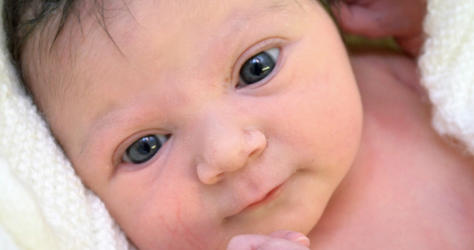Eight weeks old - Waving, books and jabs
Here’s what to expect in the eighth week of your lives together.
At a glance
- Your little one will be busy exploring their body - kickiing, waving and trying to grab
- It's a great time to introduce simple board books. They won't understand the words but they'll love hearing your voice and looking at the pictures
- It's time for their first immunisation appointment

Your baby’s development at eight weeks old
Your baby is really starting to notice their surroundings now and take an active interest in the exciting world you’ve brought them into: have you noticed how they stare fixedly at someone with a very heavy fringe or who is wearing glasses? They can tell that person is different from you and are busy working it all out.
If they’ve been smiling for a week or two, they may now be more generous with their beaming face – smiling at grandparents, siblings and even random strangers. If you’re still waiting for your baby’s first smile, don’t worry – it will happen soon. Some mums have to wait up to 12 weeks, but it will be worth it!
Your little one will also be busy exploring their body – kicking, waving and trying to grab. If you’re finding their bedcovers constantly kicked off, a baby sleeping bag might be the answer.
Reading to your eight week old baby
Now your baby’s vision is clearer and they can see primary colours, it’s a great time to introduce simple cloth or board books. No, they won’t understand what you’re saying, but they will love hearing your voice and seeing the pictures. And although it will be months and months before they say a word, the foundations for language are laid down right from the start. So talk to your baby lots, even if it makes you feel a bit foolish: research shows their baby babble follows the rhythm of your speech.
Immunisations at eight weeks old
Once they’re eight weeks old you’ll be heading for their first immunisations appointment. It can be daunting, but most mums find it isn’t nearly as bad as they feared. Do take someone with you if you feel you need a bit of support. They’ll be getting their first dose of the 6-in-1 injection which protects against diphtheria, tetanus, whooping cough (pertussis), hepatitis B, polio and Hib (haemophilus influenza type B). They’ll also have the meningococcal group B disease (MenB) plus the Rotavirus vaccination (a liquid dropped straight into the baby’s mouth). It protects against rotavirus infection, a common cause of diarrhoea and sickness. The meningitis B vaccine first dose is recommended for babies aged 8 weeks. All these vaccinations are usually given in the same visit; get advice from your GP practice if your child isn’t well that day.
Fontanelles
Your baby has two soft places on their head where the skull bones haven’t yet fused together. This was nature’s way of allowing their head to be slightly narrower to pass through the birth canal more easily. The one at the back, which is triangular and called the posterior fontanelle will probably close around now. The other, bigger, diamond-shaped one on the top of your baby’s head takes longer: it won’t close until they’re a year or 18 months old. In the mean time, if either fontanelle becomes sunken it can be a sign of dehydration. They may also bulge slightly if the baby is crying, which is slightly disconcerting. But it should return to normal when they stop – if not, see your doctor.